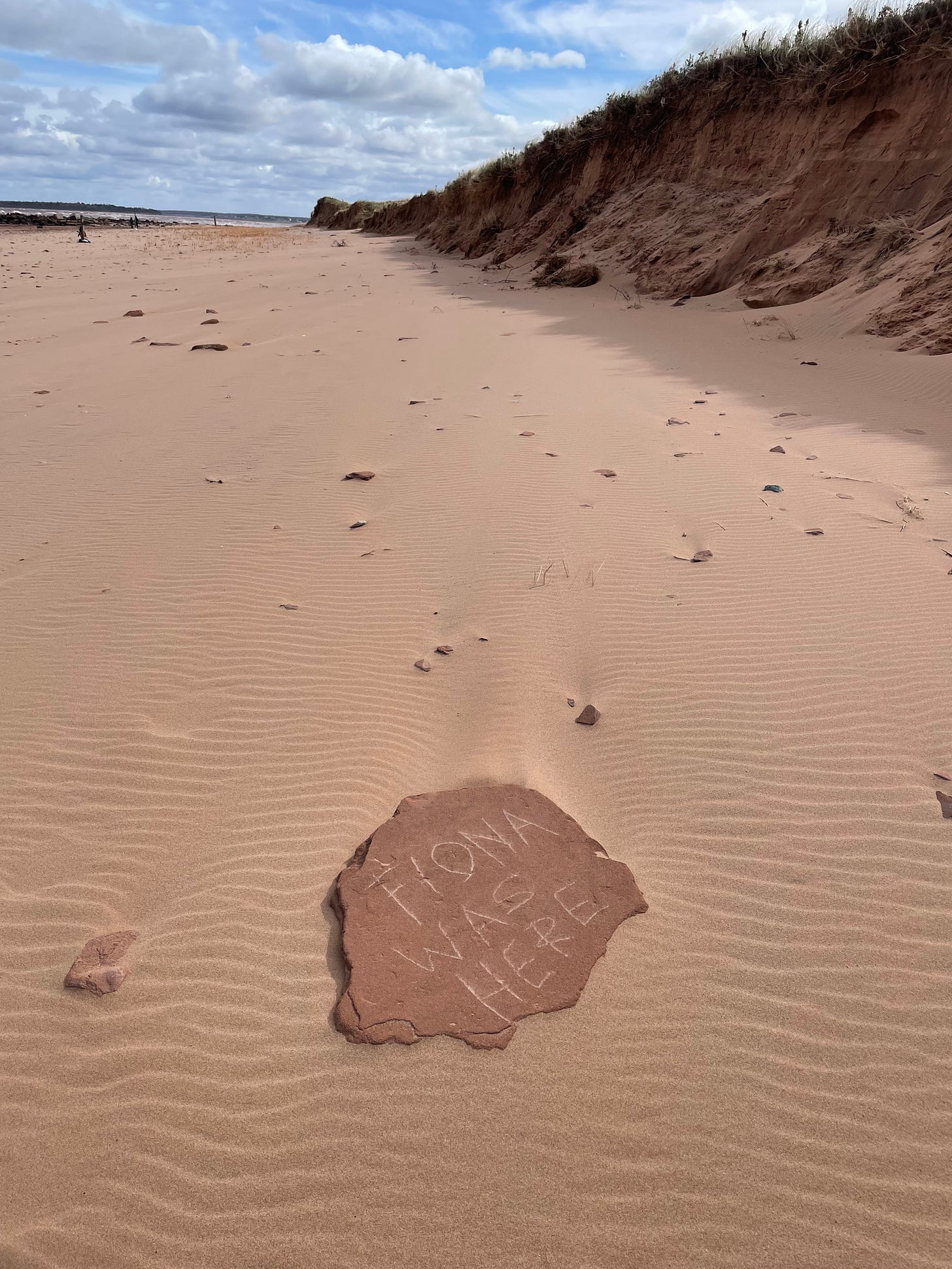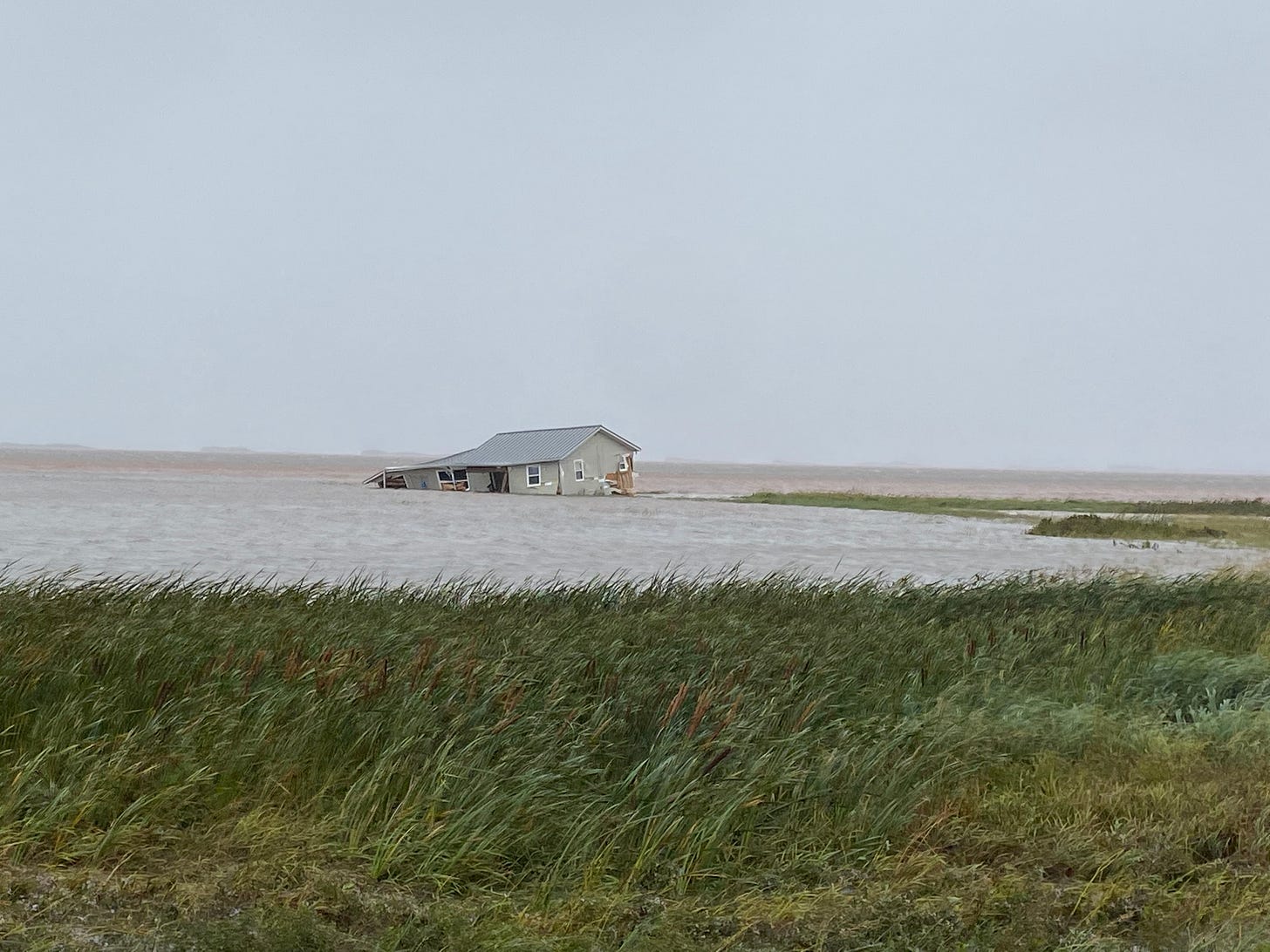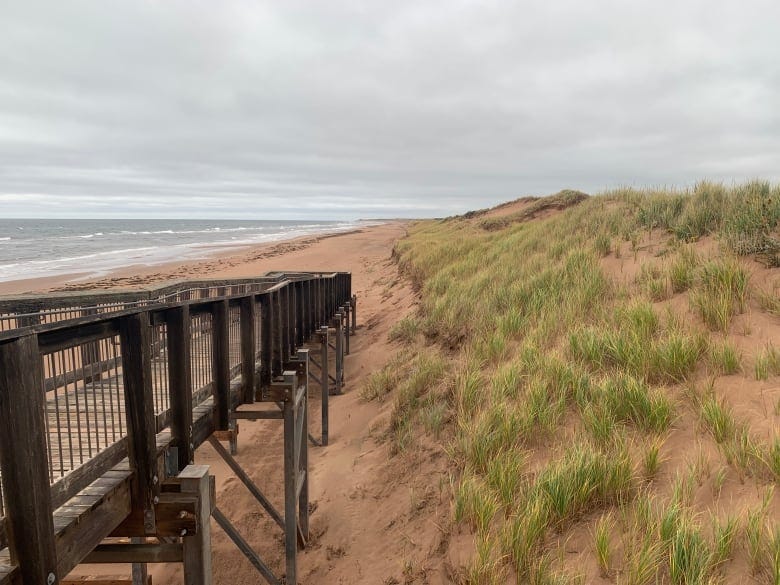Return and Recovery: In love with an island...
After Hurricane Fiona, an island community came together and showed its true colors
I live on Prince Edward Island, the smallest Province in Canada, by far, but, in my view, among the most beautiful. Beyond beauty, and the desire to remove ourselves from what we saw as a toxic political environment around us, even in Oregon, what motivated our move here was the lure of Atlantic Canada’s culture. The relaxed pace of life, the friendliness, the neighborliness, the humor, all promised to provide a welcome relief from what we were experiencing in the US. We were not disappointed, and if anything our experiences here have exceeded our expectations.
All of these attributes and more were on display this past week in the prelude to and aftermath of Hurricane Fiona, the worst hurricane to hit Atlantic Canada in recent memory. The devastation is unevenly tragic. Some locations seem pristine. Others have been destroyed. Beautiful old trees in well established residential areas were uprooted and tossed on the ground. And the north shore in particular was hit hard. Homes were dragged out into the sea and can now be seen partially submerged
The beautiful sand dunes that make up such an important part of the National Park on the North shore of the Island have now largely disappeared, as have dirt roads and docks that were also literally washed away. Here are photos that were taken of Brackley Beach Dunes before and after Fiona. :
We drove around today to get a sense of what had happened and what could be done, because we were not on the island during the storm. As readers of Critical Mass may know, I was leading Origins Project Foundation travel expeditions in Greenland and Iceland when news of the impending hurricane first appeared, and we did not return home until after it had passed.
My first notice of the hurricane came in an email from a neighbor who warned it might be a bad one. Then I learned that he and another neighbor had spent the morning taking in all the outside furniture and other items around our house before the storm hit in order to save those things from possibly being blown away (which it surely would have been, given what actually happened to so many much bigger and heavier things).
Then, after the hurricane had subsided, I got other emails from different neighbors and friends, some of whom lived a considerable distance away, saying they had checked on our house for possible storm damage. The reported some minor damage to our roof, but nothing that required emergency repair to protect against the elements, and also a downed tree that had destroyed the ramp to our dock—again, unfortunate, but not an emergency issue.
The next morning, after I had learned that power had gone out to almost the entire island I got a text from a neighbor asking if the community could use our gas generator to power the local water pumping station so residents could have access to water. Two neighbors then went down and moved the heavy device on a trailer up to the pumping station to power it.
When we returned, another neighbor met us at the airport, drove us home, and left us with some food and water. Meanwhile, in anticipation of our return, other neighbors had returned our generator and set it up at the house so that it was running when we arrived.
Over the next 4 days when there was no power, groups of us got together to get gas or donate our generators so that the community could have water for 6-8 hours each day at least. Everyone pitched in, and instead of a disaster, each time we met at the pump house it felt like a community party.
Meanwhile, while we were still without power, we woke up one morning to the sound of banging. The roofers who had installed our new roof earlier in the year had scouted the area after the storm and noticed our damage, and without our calling to ask for assistance, had preemptively arranged to come and repair the roof that morning. Given what I thought was probably far more extensive damage elsewhere, I had decided it would be weeks before it would make sense to consider calling to ask for any assistance with our repair. But the boys (see the photo below) said that as a former customer we were their priority.
As with every visit, the repair was accompanied by substantial time talking and joking. We talked about surviving the storm, about our recent trip, and about the new truck our roofer had bought. Amidst the common concern about the devastation they expressed no sense of victimhood. Just a kind of amused stoicism, and a common acceptance that all of us would do what was needed to move past last week.
Nothing is ever just a business transaction here. It is always a human interaction.
A few days later the guys who had installed our dock came floating down the river on a boat with a chain saw and a boat big enough to haul away the dock and deck for repairs. We worked together to figure out the best way to cut the tree to free the dock and not hurt anyone or cause further damage, and off they went.
I realize how lucky we are compared to so many people in the community, whose homes or property and livelihoods were otherwise devasted. But throughout the Island I hear stories of people helping other people in need. One of our contractors has spent the week with his trailer driving his generator to provide power to those who might need it for a few hours. Another neighbor, a former dairy farmer, was off to help another farmer with his barn. An awful accident had occurred in one farm that killed 35 cows, and other farms had barn roofs blown off. Farmers whose barns remained intact were preparing to house the cows of those who were not so fortunate, especially as it is unlikely, as winter approaches that the affected barns will be repaired in time.
Community is a word that means something, particularly in times of need. I am hoping the current crisis will serve as a reminder for me to ask what we can do for our neighbors and others around us on a more regular basis.
In these turbulent political times there is a depressing sense, far too often, that it is ‘us’ vs ‘them’. Our common humanity is too often forgotten. It has been heartening this week to see that humanity celebrated, and the meaning of community demonstrated everyday.
I love this place. Thanks to everyone.







This is really a heartwarming story. You really live in a place everyone dreams of and where human culture is alive.
It is good to hear stories like this that remind us of the other side of humanity. The kind and peaceful side, which seems to be getting ever rarer on larger scales. Thanks for sharing and glad to know that you're in good hands.